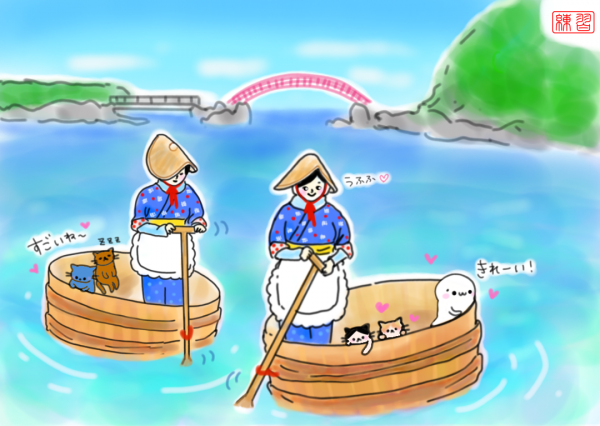Let's A (together)
Can mean "I'll A" when the subject is 1st person such as 私/わたし
- Let's A (together) Can mean "I'll A" when the subject is 1st person such as 私/わたし
- Shall I/we A?

乗ってみましょう!
Let's try riding them!
60
お早う! 朝ご飯を食べましょう!
Good morning! Let's eat breakfast together!
0
57
駅の前で会いましょう。
Let's meet in front of the station.
0
9
此のCDはいいですよ。一緒に聞きましょう。
This CD is good! Let's listen (to it) together.
0
11
さあ、ドライブへ行きましょう!
Alright, let's go on a drive!
0
17
夕飯に咖哩を作りましょう。
Let's make curry for dinner.
0
17
此の喫茶店に入りましょう。
Let’s enter this coffee shop.
0
8
12時に成りました。昼ご飯を食べましょう。
It is 12 o'clock. Let's eat lunch.
0
5
ご飯を食べる前に手を洗いましょう。
Let's wash our hands before eating.
0
3
教科書の30頁から始めましょう。
Let's begin from page 30.
0
8
何時か、近いうちに会いましょう。
Let's meet sometime in the near future.
0
11
お宅に御送り為ましょう。
Let me take you home.
0
6
此処を渡りましょう。
Let's cross here.
0
21
さあ、なかうちさん。一杯注ぎましょう。
Let me fill up your glass, Mr Nakauchi.
0
0
さぁ始めましょう。
Shall we begin?
0
6
さあ試合を始めましょう。
Now let's begin the game.
0
3
さあ出かけましょう。
Let's be off now.
0
7
じゃあその時に会いましょう。
Well then, let's meet at that time.
0
4
其のテープを聞きましょう。
Let's listen to the tape.
0
10
それでは学校へ急ぎましょう。
Now let's hurry to school.
0
Getting the sentences
List

ませんか
ましょう
ましょうか
ましょう
ましょうか
In this lesson, we will look at a few different ways to invite someone to do something with us.
~ませんか
おちゃ を のみませんか。
いちじ に ひるごはん を たべませんか。
としょかん で ほん を よみませんか。
The first kind of invitation we will look at is the most polite, and uses the negative verb ending ません that we already learned, plus the question particle か.
The first kind of invitation we will look at is the most polite, and uses the negative verb ending ません that we already learned, plus the question particle か.
This is kind of similar to the phrase “won’t you…?” in English. For example, the Alphabet Song ends with the line “next time won’t you sing with me?”
You can use all the particles we have already learned in your invitation as well to make them as specific as you want.
This would be “Would you like to have some tea?”
This would be “Would you like to have lunch at 1:00?”
And this would be “Would you like to read books at the library?”
~ましょう
~ましょうか
~ましょうか
およぎましょう
およぎましょうか
およぎましょうか
テニス を しましょう。
さん じ に いきましょうか。
しゃしん を とりましょうか。
The next type of invitation we will look at is still polite, but not quite as formal as ませんか. This uses a new variation on the ます form, ましょう. You can also add the question particle か to the end.
The next type of invitation we will look at is still polite, but not quite as formal as ませんか. This uses a new variation on the ます form, ましょう. You can also add the question particle か to the end.
You will conjugate this form the same way you would any polite verb, but you will end with ましょう instead of ます or ません.
Using ましょう more closely aligns with the English phrase “Let’s …”, while ましょうか is more like “Shall we…?”
So およぎましょう would be “Let’s swim!”, while およぎましょうか would be “Shall we swim?”
Just like with our other invitations, you can use ましょう and ましょうか with all the other particles we have learned.
So this would be “Let’s play tennis!”
And this would be “Shall we go at 3:00?”
You can also use ましょうか to offer assistance.
For example, if you are offering to take a photo of someone, you can say しゃしんをとりましょうか, which you can translate as either “Shall I take a photo (of you)?” or “Would you like me to take a photo?”
To recap, the suffix ませんか can be used for polite invitations.
To recap, the suffix ませんか can be used for polite invitations.
ましょう is the most casual, and is closer to “Let's ..”, and ましょうか (“Shall we ..”) falls in the middle.
Construction
(Elements in parentheses are optional.)
Basic Examples:
行きましょう (let's go)
Related Expressions
ませんか
Volitional/意志
Volitional/意志
Where this grammar is found
Grammar usage notes
You can better remember this if you think back to ですか. There you are asking something. Same here. まじゅうか is ASKING shall we _____?
Questions/Discussion
Nothing posted yet!
Shall I/we A?
- Let's A (together) Can mean "I'll A" when the subject is 1st person such as 私/わたし
- Shall I/we A?
11
ね、一緒に行きましょう?
Hey, shall we go together?
0
11
人ごみが嫌なら、公園に行きましょうか。
If you don't like crowds, why don't we go to the park?
0
7
品物をお取り寄せいたしましょうか。
Would you like me to order the goods?
0
9
コートを持ちましょうか。
Shall I carry your coat?
0
2
此のカレンダーは何処に掛けましょうか。
Where shall I hang this calendar?
0
12
御注文を承りましょうか。
May I take your order?
0
11
御伝言を伺いましょうか。
Can I take a message?
0
10
では会議を始めましょうか。
Shall we start the meeting now?
0
4
先生へのお礼は何を差し上げましょうか。
What shall we give to the teacher to show our gratitude?
0
13
休憩為ましょうか。
Shall we take a rest?
0
14
最後の2節を省略為て歌いましょうか。
Lets sing it while omitting the last two verses.
0
2
夕飯はオムライスに為ましょうか。
Shall we have om-rice for dinner?
0
49
手伝いましょうか?
Shall I help?
0
8
代わりに私が遣りましょうか?
Shall I do it instead (of you)?
0
9
御気分が悪いのですか?背中を摩って差し上げましょうか?
Do you feel sick? Shall I give you a back rub?
0
6
御精が出ますね、夜食でも御作りしましょうか。
You're working hard; how about I make you supper or something?
0
Getting the sentences
Construction
(Elements in parentheses are optional.)
Basic Examples:
踊りましょうか? (Shall we dance?)
Related Expressions
ませんか
Volitional/意志
Volitional/意志
Where this grammar is found
Grammar usage notes
Nothing posted yet!
Questions/Discussion
Nothing posted yet!